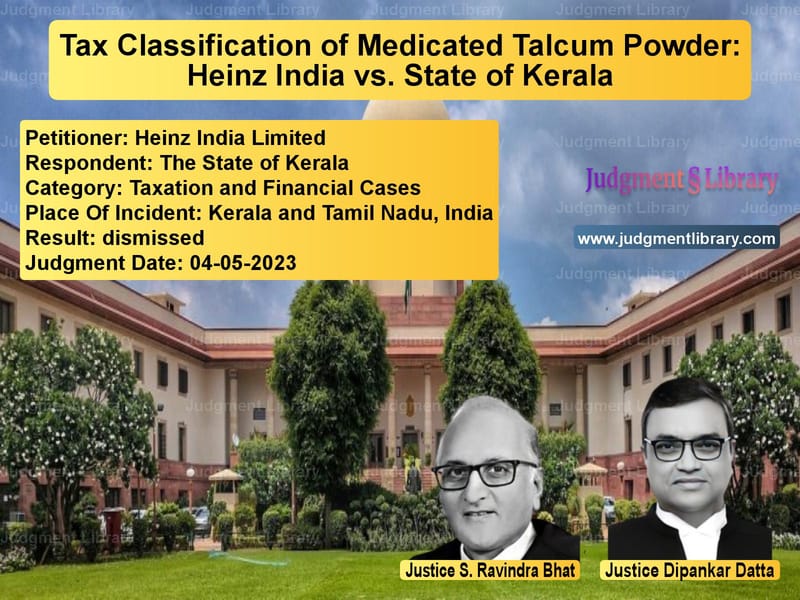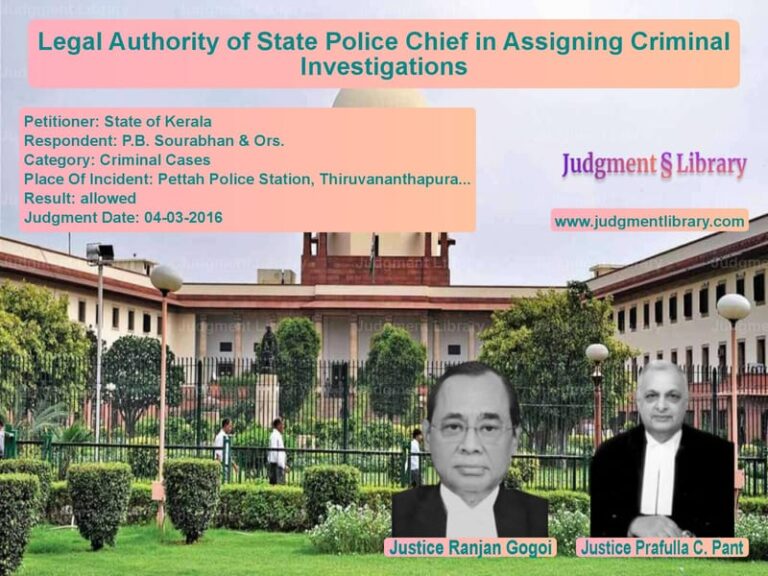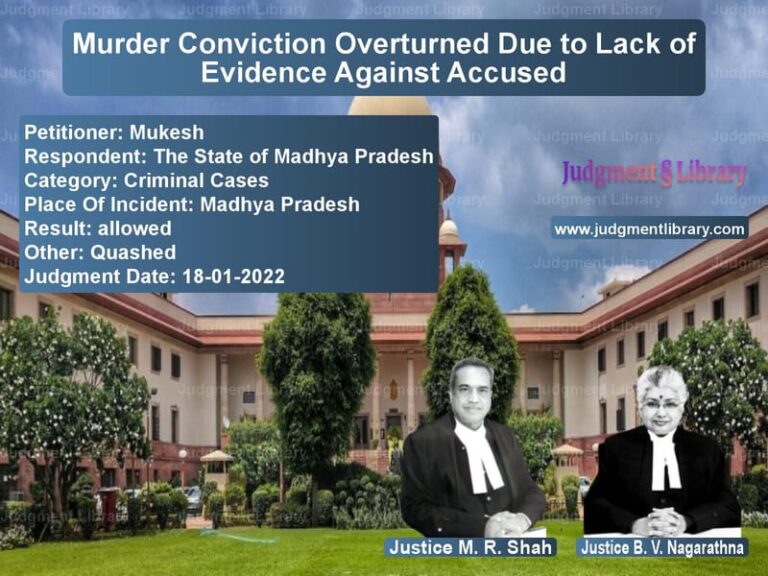Tax Classification of Medicated Talcum Powder: Heinz India vs. State of Kerala
The case of Heinz India Limited vs. The State of Kerala delves into the complex question of whether medicated talcum powder should be classified as a cosmetic or a medicinal product for taxation purposes. This dispute, which also involved Glaxo SmithKline Pharmaceuticals Ltd (GSK), brought forth significant legal arguments regarding tax classification and the interpretation of fiscal statutes.
At the heart of this case was the taxation of Nycil Prickly Heat Powder, a product claimed by the manufacturers to be a medicinal formulation due to its antibacterial and antifungal properties. The tax authorities in Kerala and Tamil Nadu, however, classified it as a cosmetic item, subjecting it to a higher tax rate.
Background of the Case
The dispute arose from assessments made by the tax authorities in Kerala and Tamil Nadu for different financial years. Heinz India Limited and Glaxo SmithKline Pharmaceuticals Ltd contested the classification of their product under state sales tax laws.
In Kerala, the issue pertained to assessment years 1999-2000 and 2000-2001. The initial assessment had accepted Nycil Prickly Heat Powder under Entry 79 of the First Schedule of the Kerala General Sales Tax Act (KGST Act), which classified it as a medicine taxable at 8%. However, the revisional authority found this assessment to be prejudicial to the revenue and proposed a tax rate of 20%, classifying it as “Medicated Talcum Powder.” The Kerala High Court upheld this classification.
Similarly, in Tamil Nadu, the Madras High Court ruled against GSK, rejecting its contention that Nycil Prickly Heat Powder was a medicinal preparation. The court classified it as a cosmetic under Entry 1(iii) of Part F of the First Schedule to the Tamil Nadu General Sales Tax Act (TNGST Act), thereby subjecting it to a higher tax rate.
Petitioners’ Arguments
The petitioners, Heinz India and GSK, presented the following key arguments:
- Nycil Prickly Heat Powder contains Chlorphenesin, an antifungal and antibacterial agent, along with zinc oxide and boric acid, which have therapeutic properties.
- The product is designed to prevent and treat skin ailments, including prickly heat and fungal infections, making it a medicinal formulation rather than a cosmetic.
- It is manufactured under a drug license issued under the Drugs and Cosmetics Act, 1940, further supporting its classification as a medicine.
- Relying on past Supreme Court rulings, the petitioners contended that a product’s classification should be based on its composition and purpose, not just its commercial perception.
Respondents’ Arguments
The state tax authorities countered these claims with the following arguments:
- The legislature had explicitly included “Medicated Talcum Powder” under the category of cosmetics in the Kerala and Tamil Nadu sales tax laws.
- The presence of medicinal ingredients does not automatically make a product a medicine; rather, the primary function of the product determines its classification.
- The product was available over the counter without a prescription and was marketed as a personal care item, aligning more with cosmetics than with medicines.
- Past judicial decisions have classified similar products, including Johnson’s Prickly Heat Powder and Vaseline, as cosmetics rather than drugs.
Key Judicial Findings
The Supreme Court reviewed various judicial precedents and taxation principles before arriving at its decision. Some key points from the judgment include:
Interpretation of Fiscal Statutes
The Court emphasized that tax laws must be interpreted in accordance with their plain meaning. The presence of an “inclusive” definition in the tax entries for cosmetics indicated a legislative intent to tax medicated talcum powder at a higher rate.
Common Parlance Test
The Court applied the “common parlance test,” which assesses how consumers perceive a product. Given that Nycil Prickly Heat Powder is widely recognized as a personal care product rather than a medicine, the Court concluded that it was correctly classified as a cosmetic.
Legislative Intent
The Court noted that the legislative history of the sales tax laws in Kerala and Tamil Nadu demonstrated a clear intent to classify talcum powders, including medicated variants, as cosmetics.
Comparison with Past Cases
The judgment referenced previous rulings, including Puma Ayurvedic Herbal Pvt Ltd v. Collector of Central Excise and Muller & Phipps (India) Ltd v. Collector of Central Excise, where similar products were held to be cosmetics based on their primary function.
Final Verdict
After considering all arguments and judicial precedents, the Supreme Court upheld the Kerala and Madras High Court rulings, concluding that Nycil Prickly Heat Powder should be classified as a medicated talcum powder rather than a medicine.
The Court ruled:
“The clear legislative intent, manifested in plain words, must be accepted. The inclusion of ‘medicated talcum powder’ in the category of cosmetics under the relevant tax laws rules out any interpretive scope for classifying it as a medicinal preparation.”
Consequently, the appeals by Heinz India Limited and GSK were dismissed, affirming the tax classification of Nycil Prickly Heat Powder as a cosmetic.
Implications of the Judgment
This ruling has significant implications for companies manufacturing products with both medicinal and cosmetic properties:
- Manufacturers must carefully analyze tax classifications before marketing their products.
- The presence of medicinal ingredients alone is insufficient to classify a product as a medicine.
- The primary function of the product, along with legislative intent, determines its tax classification.
- Companies selling similar products may need to revise pricing strategies to account for higher tax rates.
This case serves as a crucial precedent in the realm of tax disputes concerning hybrid products that exhibit both medicinal and cosmetic characteristics.
Petitioner Name: Heinz India Limited.Respondent Name: The State of Kerala.Judgment By: Justice S. Ravindra Bhat, Justice Dipankar Datta.Place Of Incident: Kerala and Tamil Nadu, India.Judgment Date: 04-05-2023.
Don’t miss out on the full details! Download the complete judgment in PDF format below and gain valuable insights instantly!
Download Judgment: heinz-india-limited-vs-the-state-of-kerala-supreme-court-of-india-judgment-dated-04-05-2023.pdf
Directly Download Judgment: Directly download this Judgment
See all petitions in Tax Evasion Cases
See all petitions in Tax Refund Disputes
See all petitions in Banking Regulations
See all petitions in Judgment by S Ravindra Bhat
See all petitions in Judgment by Dipankar Datta
See all petitions in dismissed
See all petitions in supreme court of India judgments May 2023
See all petitions in 2023 judgments
See all posts in Taxation and Financial Cases Category
See all allowed petitions in Taxation and Financial Cases Category
See all Dismissed petitions in Taxation and Financial Cases Category
See all partially allowed petitions in Taxation and Financial Cases Category







